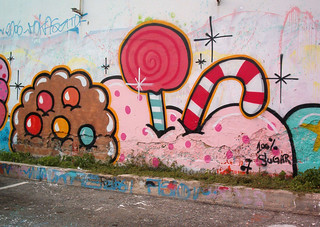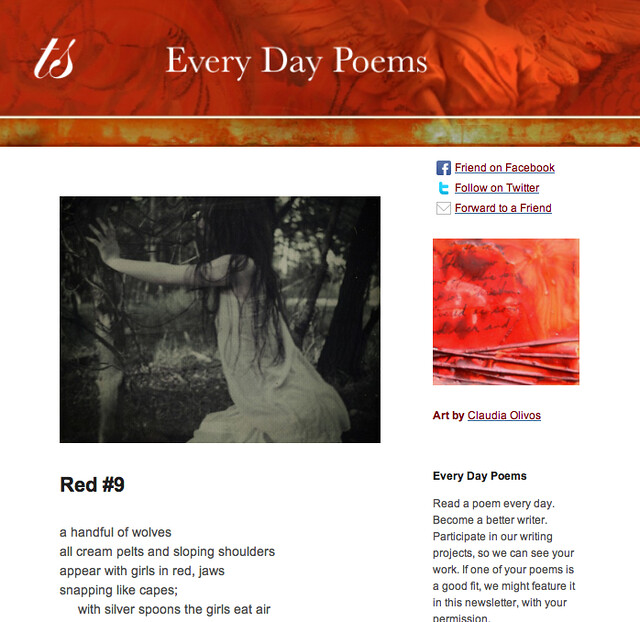Poetry can be hard. Hard to read and hard to write. But this doesn’t mean it can’t be fun. And enlightening at the same time. Kind of like candy for the mind.
Hard candy, perhaps. Like Ezra Pound’s “In a Station of the Metro”:
The apparition of these faces in the crowd;
Petals on a wet black bough.
That’s it. The entire poem. Deceptively short. Seemingly easy breezy. But like a piece of hard candy, the more you work at it, the longer it seems to last. Volumes have been written on Pound and the school of Imagist poetry to which this work belongs. The hard-packed language, the compressed emotion, the seemingly random linking of images to convey feeling, the profound implications of a word like “apparition” make this poem much more than it first seems.
More like bubble gum, endlessly expandable and malleable, is Lewis Carroll’s “Jabberwocky.” Surely you remember this one. It begins like this and ends in the same vein:
‘Twas brillig, and the slithy toves
Did gyre and gimble in the wabe;
All mimsy were the borogoves,
And the mome raths outgrabe.
“Beware the Jabberwock, my son
The jaws that bite, the claws that catch!
Beware the Jubjub bird, and shun
The frumious Bandersnatch!”
It seems mere silliness, but there is a method to Carroll’s madness, for the way we assign meaning to the nonsense words demonstrates the expansive and malleable nature of language itself.
A little tougher than bubble gum, but just as stretchy is taffy–and e. e. cummings. (See, even his name alone is as playful!). Like a piece of taffy, his poetry is colorful and bright, but strong and chewy, too. Cummings’ poems look deceptively like child’s play, but there is much more than first graces the tongue, and it takes a bit of work to subdue it. Here are the closing lines of “in just—“ (just to give a taste):
it’s
spring
and
the
goat-footed
balloonMan whistles
far
and
wee
Not to everyone’s taste (perhaps not many), is black licorice–and this dark, dusky poem by the feminist writer Margaret Atwood. (Confession: I don’t like black licorice at all, but I do love this devilishly clever poem). It goes like this:
You fit into me
like a hook into an eye
A fish hook
An open eye
Ouch.
A gentler kind of candy—and poem—is the simple Dumdum pop. Remember those? For how many children is a Dumdum pop their first introduction to candy? Mild, but totally sweet, and with a stick that prevents choking. I think it was the first candy I had as a child. Likewise one of my first—and favorite—poems from back then is this:
I eat my peas with honey.
I’ve done it all my life.
They do taste kind of funny,
But it keeps them on the knife.
Oh, how I loved—and still love—this poem. But yet again, there is more here than the surface silliness suggests. For we see that this strangeness of eating peas with honey actually has a reasonable cause: keeping the peas on the knife. But then we realize—even as children—that the problem begins with using the wrong tool—a knife—to eat peas. Like so many other things in life, one false turn results from another. What an important lesson conveyed in such a fun way!
And they say candy’s not good for you.
Photo by Graffiti Land. Sourced via Flickr. Post by Karen Swallow Prior.
___________
Buy a year of Every Day Poems, just $5.99— Read a poem a day, become a better poet. In April we’re exploring the theme Candy.
- Have We Outlived Epic Poetry? Maybe, But Herrera to Rowling Say No - September 25, 2015
- About Shakespeare: Poet and Playwright - August 29, 2014
- Poetry Classroom: A Valediction—Forbidding Mourning - February 27, 2013


L. L. Barkat says
That Atwood poem is so… Atwood. And why do I love it that you put it in a post on Candy Poems? You see so wonderfully. 🙂
Megan Willome says
Nice collection! I tried once to imitate Pound’s poem. That’s when I realized how brilliant it was.
KSP says
It is much easier for me to see the poems than to write them! 🙂 I’m thankful for the brilliance I can see in the likes of Atwood and Pound.
Maureen Doallas says
Wonderful post, Karen.
I might have to argue about that knife and peas, having chased quite a few around the plate with a fork. Now, a knife and a fork, hand in hand, work well in a kind of push-and-lift way.
Those chilling Atwood lines. . . every time I read them I come away awed.
KSP says
Thanks, Maureen. I would never in my wildest dreams have written something connecting poetry and candy, but that’s the kind of magic L. L. has! She really stretched me.
And I will grant you both the knife-and-fork trick and the Atwood accolade.